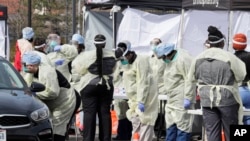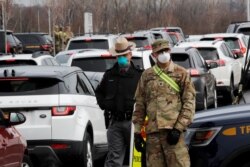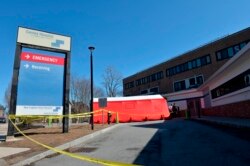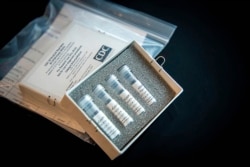Native Americans in tribes across the United States are coming together to help safeguard their families and communities in the face of the COVID-19 pandemic. They say they face worrying shortages of medical supplies, though, particularly coronavirus test kits.
The Indian Health Service, an arm of the U.S. Health and Human Services Department, said it is in constant contact with the White House and the U.S. Centers for Disease Control and Prevention. In a fact sheet published on its website, it assured readers that all IHS clinics “have access to testing” for COVID-19.
But some tribes and Nations report shortages of test kits — or no test kits at all.
Rodney Bordeaux, president of the Rosebud Sioux Tribe in South Dakota, this week wrote to the directors of both the World Health Organization and the Pan American Health Organization, calling on them for assistance.
“We believe that some kits have been sent to the states, but it is the states that have been determining who gets a test and who does not,” he wrote in a letter, a transcript of which the tribe’s attorney general’s office published on its Facebook page Tuesday.
“We have approximately 30,000 tribal members living in south central South Dakota with access to fewer than 200 beds within our reservation,” Bordeaux wrote.
Elsewhere, Aaron Payment, chairperson of the Sault Ste. Marie Tribe of Chippewa Indians in Michigan, criticized the U.S. federal response to the coronavirus as “woefully inadequate.”
“We're the largest tribe east of the Mississippi, and we have two test kits,” he told the Albuquerque-based Native America Calling radio show.
The problem isn’t just limited to reservations or IHS facilities, but also health care facilities catering to urban Indians.
“We don’t have COVID-19 tests, personal protective equipment or cleaning supplies,” said Rick Emery, an urgent care physician assistant at the Oyate Health Center in Rapid City, S.D., which services members of the Pine Ridge and Cheyenne tribes living off reservation. “Staff are worried.”
Earlier this week, the health center began limiting the number of entry points and visitors to its campus to limit personal exposure.
Some tribes, however, appear to be a little better equipped to handle the virus: The Navajo Nation Indian Health Service told Utah public radio that so far it has tested more than 100 individuals for coronavirus.
Fourteen citizens of the Navajo Nation have tested positive for the virus to date, and most of them live in the small community of Chilchinbeto in Navajo County, Arizona. The Navajo Department of Health and Navajo Office of Environmental Health and Protection have ordered the community’s 500 residents on lockdown.
“IHS facilities generally have access to testing for individuals who may have COVID-19, however there are nationwide shortages of materials that may temporarily affect the availability of COVID-19 testing at a particular location,” IHS spokesman Marshall Cohen told VOA via email.
“Specific kits are not needed for COVID-19 test,” he explained. "Samples for COVID-19 tests are collected using standard swabs, which are then submitted to outside laboratories for testing."
Cohen admitted that there are shortages not only of swabs but of the medium used for testing.
“Tribes should first follow their usual process for ordering supplies…If tribes are not able to access supplies through their usual method, then they should contact their IHS Area Office who can access supplies through the IHS National Supply Service Center.”
American Indians and Alaska Natives (AI/ANs) worry the coronavirus could affect them more severely than other communities around the country, remembering they were hit disproportionately during the 2009 H1N1 influenza pandemic, with an overall death rate four times higher than in all other racial and ethnic groups. Some Native communities were decimated by the 1918-19 Spanish Flu pandemic.
The U.S. Centers for Disease Control and Prevention says AI/ANs are particularly vulnerable to epidemic infections, owing to higher rates of poverty and underlying chronic illness, such as diabetes, heart disease and asthma.







